Tesco Operations Management: Leadership, Roles, and Business Impact
VerifiedAdded on 2023/06/15
|15
|4555
|224
Report
AI Summary
This report examines the roles of leaders and managers in Tesco's operations management, focusing on how these roles contribute to achieving business objectives. It compares the characteristics of leaders and managers, providing examples of their application in different situational contexts within Tesco. The report applies various leadership theories and models, including situational leadership, systems leadership, and contingency theory, to analyze Tesco's operational strategies. It also discusses key approaches to operations management, such as Business Process Redesign (BPR), and their importance in enhancing efficiency and profitability. Furthermore, the report considers the factors within the business environment that impact Tesco's operational management, ultimately concluding with insights on how effective leadership and management can drive Tesco's success.
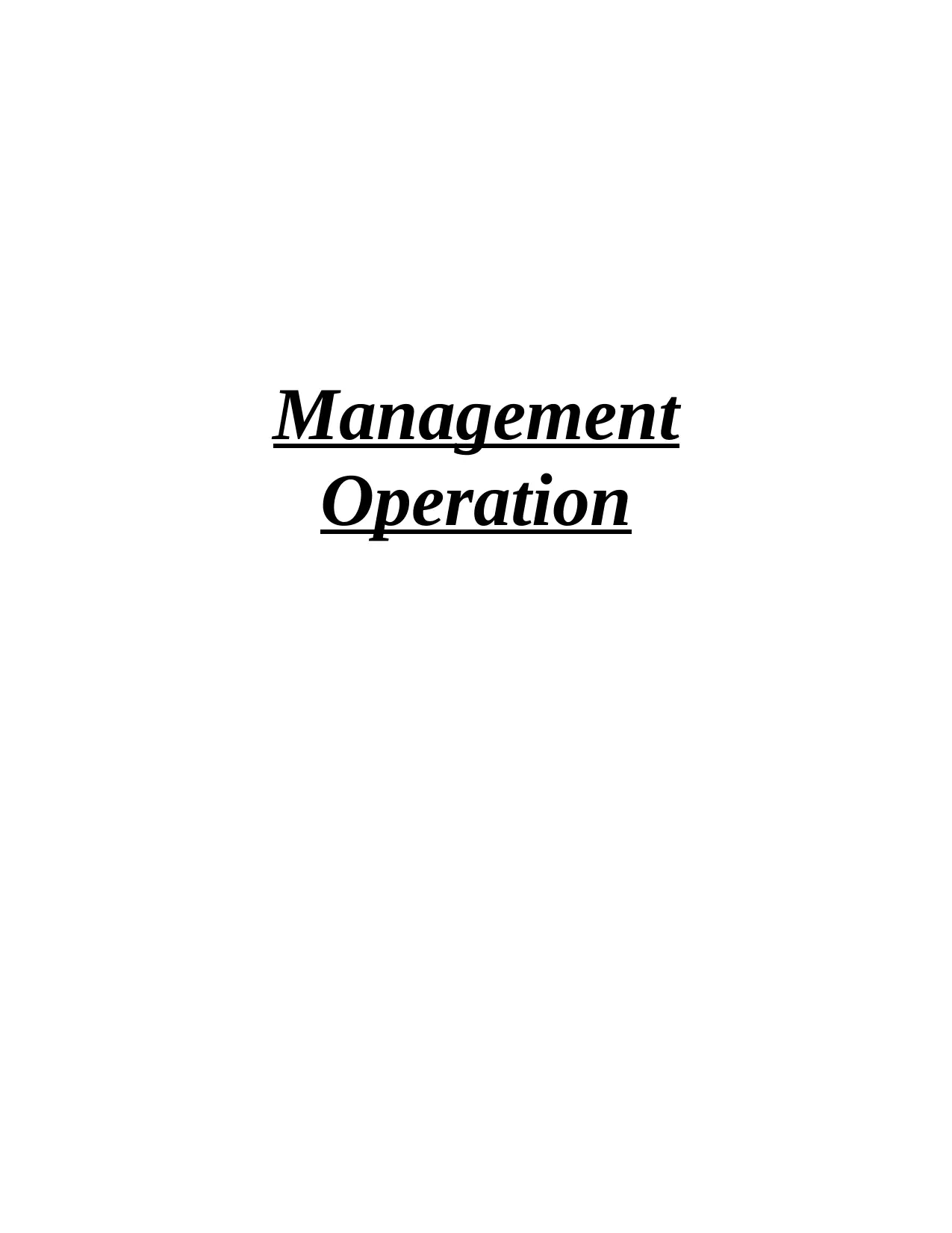
Management
Operation
Operation
Paraphrase This Document
Need a fresh take? Get an instant paraphrase of this document with our AI Paraphraser
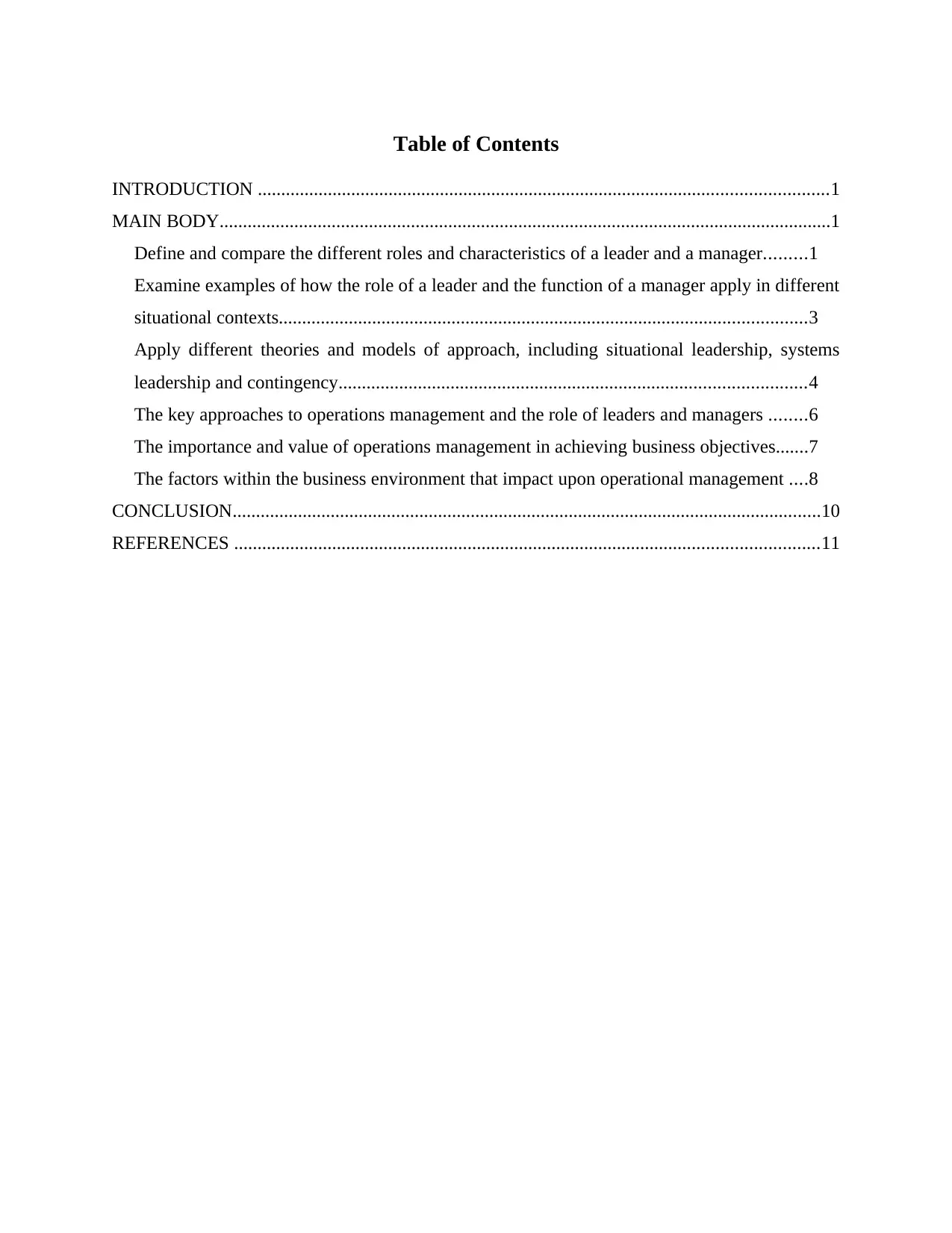
Table of Contents
INTRODUCTION ..........................................................................................................................1
MAIN BODY...................................................................................................................................1
Define and compare the different roles and characteristics of a leader and a manager.........1
Examine examples of how the role of a leader and the function of a manager apply in different
situational contexts.................................................................................................................3
Apply different theories and models of approach, including situational leadership, systems
leadership and contingency....................................................................................................4
The key approaches to operations management and the role of leaders and managers ........6
The importance and value of operations management in achieving business objectives.......7
The factors within the business environment that impact upon operational management ....8
CONCLUSION..............................................................................................................................10
REFERENCES .............................................................................................................................11
INTRODUCTION ..........................................................................................................................1
MAIN BODY...................................................................................................................................1
Define and compare the different roles and characteristics of a leader and a manager.........1
Examine examples of how the role of a leader and the function of a manager apply in different
situational contexts.................................................................................................................3
Apply different theories and models of approach, including situational leadership, systems
leadership and contingency....................................................................................................4
The key approaches to operations management and the role of leaders and managers ........6
The importance and value of operations management in achieving business objectives.......7
The factors within the business environment that impact upon operational management ....8
CONCLUSION..............................................................................................................................10
REFERENCES .............................................................................................................................11
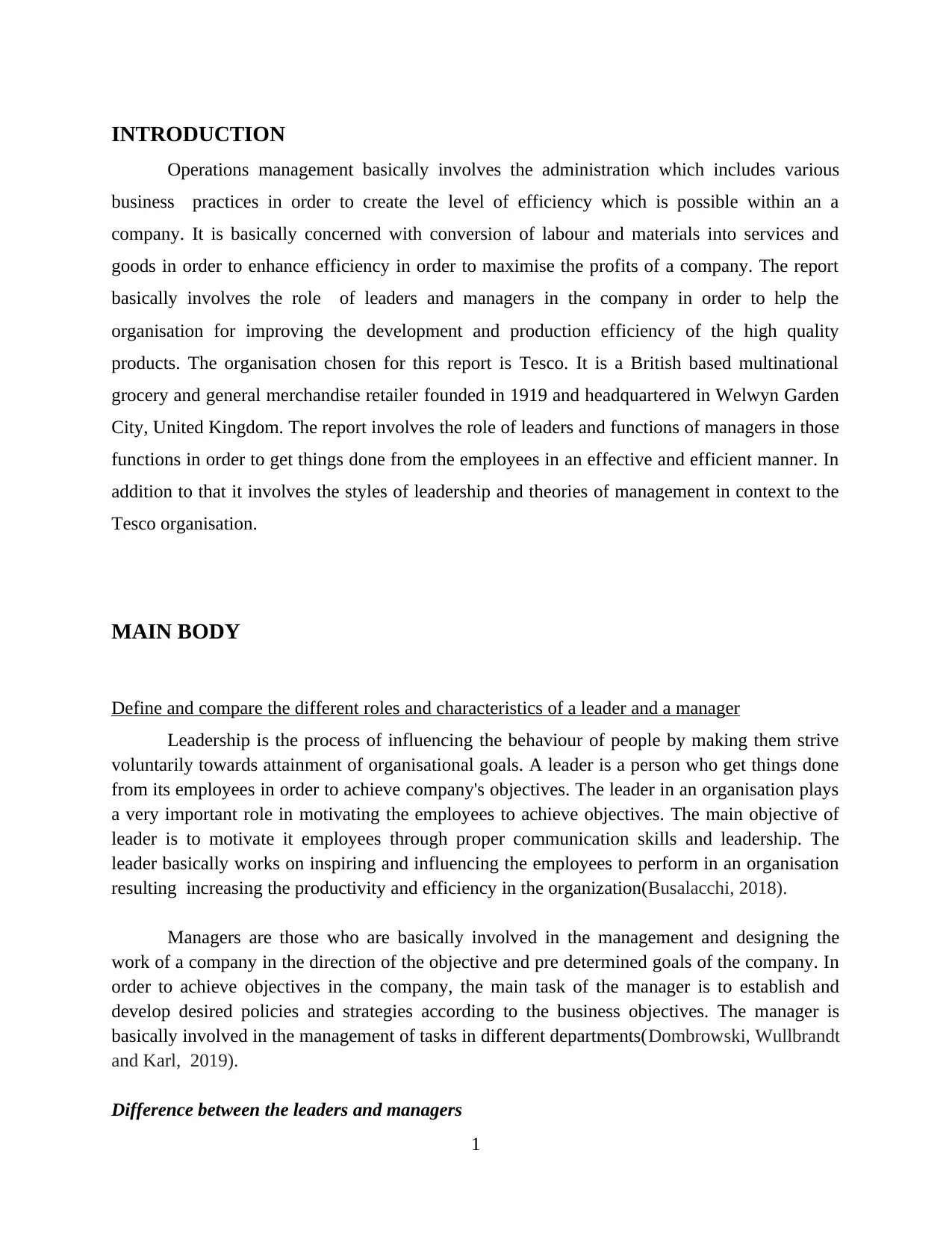
INTRODUCTION
Operations management basically involves the administration which includes various
business practices in order to create the level of efficiency which is possible within an a
company. It is basically concerned with conversion of labour and materials into services and
goods in order to enhance efficiency in order to maximise the profits of a company. The report
basically involves the role of leaders and managers in the company in order to help the
organisation for improving the development and production efficiency of the high quality
products. The organisation chosen for this report is Tesco. It is a British based multinational
grocery and general merchandise retailer founded in 1919 and headquartered in Welwyn Garden
City, United Kingdom. The report involves the role of leaders and functions of managers in those
functions in order to get things done from the employees in an effective and efficient manner. In
addition to that it involves the styles of leadership and theories of management in context to the
Tesco organisation.
MAIN BODY
Define and compare the different roles and characteristics of a leader and a manager
Leadership is the process of influencing the behaviour of people by making them strive
voluntarily towards attainment of organisational goals. A leader is a person who get things done
from its employees in order to achieve company's objectives. The leader in an organisation plays
a very important role in motivating the employees to achieve objectives. The main objective of
leader is to motivate it employees through proper communication skills and leadership. The
leader basically works on inspiring and influencing the employees to perform in an organisation
resulting increasing the productivity and efficiency in the organization(Busalacchi, 2018).
Managers are those who are basically involved in the management and designing the
work of a company in the direction of the objective and pre determined goals of the company. In
order to achieve objectives in the company, the main task of the manager is to establish and
develop desired policies and strategies according to the business objectives. The manager is
basically involved in the management of tasks in different departments(Dombrowski, Wullbrandt
and Karl, 2019).
Difference between the leaders and managers
1
Operations management basically involves the administration which includes various
business practices in order to create the level of efficiency which is possible within an a
company. It is basically concerned with conversion of labour and materials into services and
goods in order to enhance efficiency in order to maximise the profits of a company. The report
basically involves the role of leaders and managers in the company in order to help the
organisation for improving the development and production efficiency of the high quality
products. The organisation chosen for this report is Tesco. It is a British based multinational
grocery and general merchandise retailer founded in 1919 and headquartered in Welwyn Garden
City, United Kingdom. The report involves the role of leaders and functions of managers in those
functions in order to get things done from the employees in an effective and efficient manner. In
addition to that it involves the styles of leadership and theories of management in context to the
Tesco organisation.
MAIN BODY
Define and compare the different roles and characteristics of a leader and a manager
Leadership is the process of influencing the behaviour of people by making them strive
voluntarily towards attainment of organisational goals. A leader is a person who get things done
from its employees in order to achieve company's objectives. The leader in an organisation plays
a very important role in motivating the employees to achieve objectives. The main objective of
leader is to motivate it employees through proper communication skills and leadership. The
leader basically works on inspiring and influencing the employees to perform in an organisation
resulting increasing the productivity and efficiency in the organization(Busalacchi, 2018).
Managers are those who are basically involved in the management and designing the
work of a company in the direction of the objective and pre determined goals of the company. In
order to achieve objectives in the company, the main task of the manager is to establish and
develop desired policies and strategies according to the business objectives. The manager is
basically involved in the management of tasks in different departments(Dombrowski, Wullbrandt
and Karl, 2019).
Difference between the leaders and managers
1
⊘ This is a preview!⊘
Do you want full access?
Subscribe today to unlock all pages.

Trusted by 1+ million students worldwide
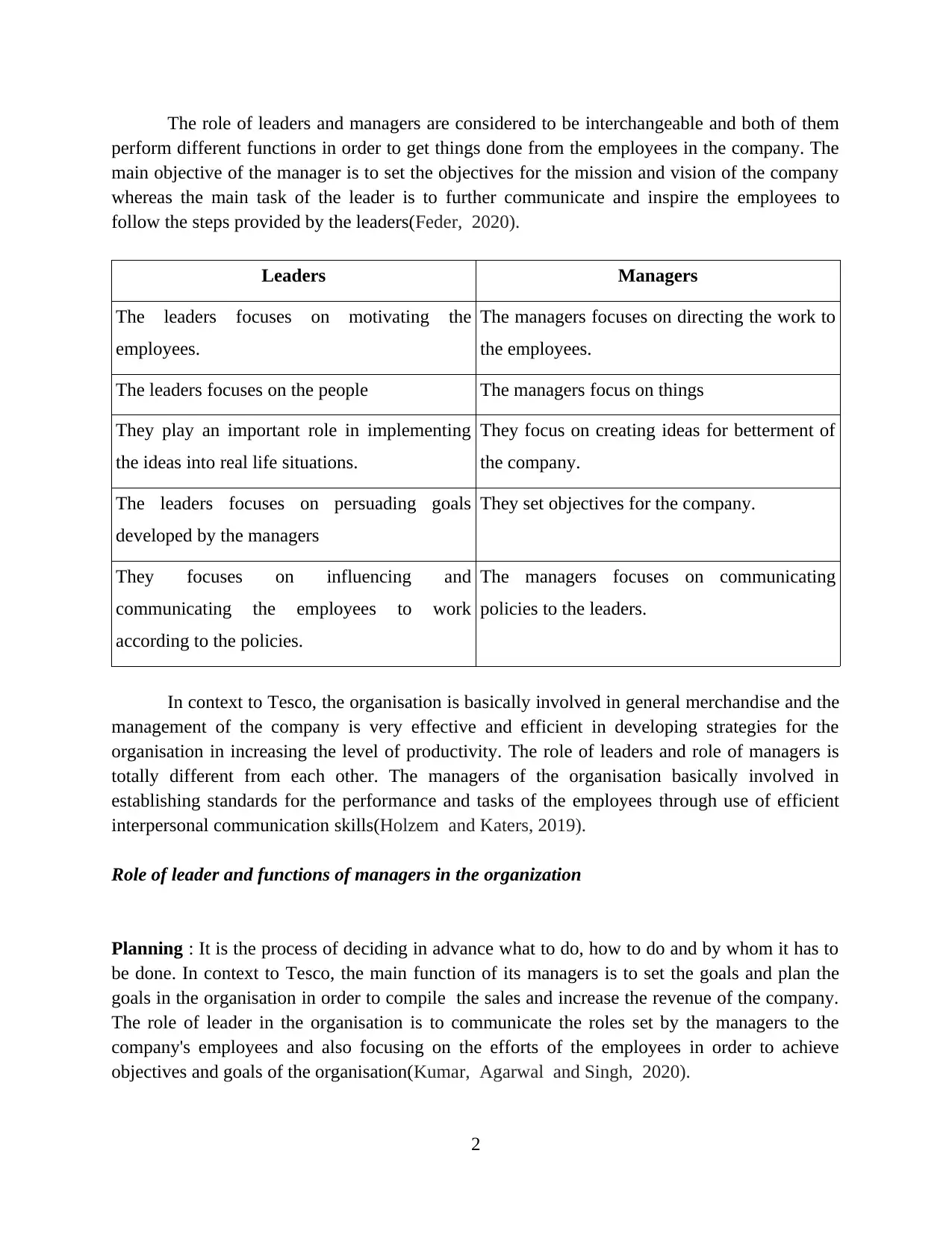
The role of leaders and managers are considered to be interchangeable and both of them
perform different functions in order to get things done from the employees in the company. The
main objective of the manager is to set the objectives for the mission and vision of the company
whereas the main task of the leader is to further communicate and inspire the employees to
follow the steps provided by the leaders(Feder, 2020).
Leaders Managers
The leaders focuses on motivating the
employees.
The managers focuses on directing the work to
the employees.
The leaders focuses on the people The managers focus on things
They play an important role in implementing
the ideas into real life situations.
They focus on creating ideas for betterment of
the company.
The leaders focuses on persuading goals
developed by the managers
They set objectives for the company.
They focuses on influencing and
communicating the employees to work
according to the policies.
The managers focuses on communicating
policies to the leaders.
In context to Tesco, the organisation is basically involved in general merchandise and the
management of the company is very effective and efficient in developing strategies for the
organisation in increasing the level of productivity. The role of leaders and role of managers is
totally different from each other. The managers of the organisation basically involved in
establishing standards for the performance and tasks of the employees through use of efficient
interpersonal communication skills(Holzem and Katers, 2019).
Role of leader and functions of managers in the organization
Planning : It is the process of deciding in advance what to do, how to do and by whom it has to
be done. In context to Tesco, the main function of its managers is to set the goals and plan the
goals in the organisation in order to compile the sales and increase the revenue of the company.
The role of leader in the organisation is to communicate the roles set by the managers to the
company's employees and also focusing on the efforts of the employees in order to achieve
objectives and goals of the organisation(Kumar, Agarwal and Singh, 2020).
2
perform different functions in order to get things done from the employees in the company. The
main objective of the manager is to set the objectives for the mission and vision of the company
whereas the main task of the leader is to further communicate and inspire the employees to
follow the steps provided by the leaders(Feder, 2020).
Leaders Managers
The leaders focuses on motivating the
employees.
The managers focuses on directing the work to
the employees.
The leaders focuses on the people The managers focus on things
They play an important role in implementing
the ideas into real life situations.
They focus on creating ideas for betterment of
the company.
The leaders focuses on persuading goals
developed by the managers
They set objectives for the company.
They focuses on influencing and
communicating the employees to work
according to the policies.
The managers focuses on communicating
policies to the leaders.
In context to Tesco, the organisation is basically involved in general merchandise and the
management of the company is very effective and efficient in developing strategies for the
organisation in increasing the level of productivity. The role of leaders and role of managers is
totally different from each other. The managers of the organisation basically involved in
establishing standards for the performance and tasks of the employees through use of efficient
interpersonal communication skills(Holzem and Katers, 2019).
Role of leader and functions of managers in the organization
Planning : It is the process of deciding in advance what to do, how to do and by whom it has to
be done. In context to Tesco, the main function of its managers is to set the goals and plan the
goals in the organisation in order to compile the sales and increase the revenue of the company.
The role of leader in the organisation is to communicate the roles set by the managers to the
company's employees and also focusing on the efforts of the employees in order to achieve
objectives and goals of the organisation(Kumar, Agarwal and Singh, 2020).
2
Paraphrase This Document
Need a fresh take? Get an instant paraphrase of this document with our AI Paraphraser
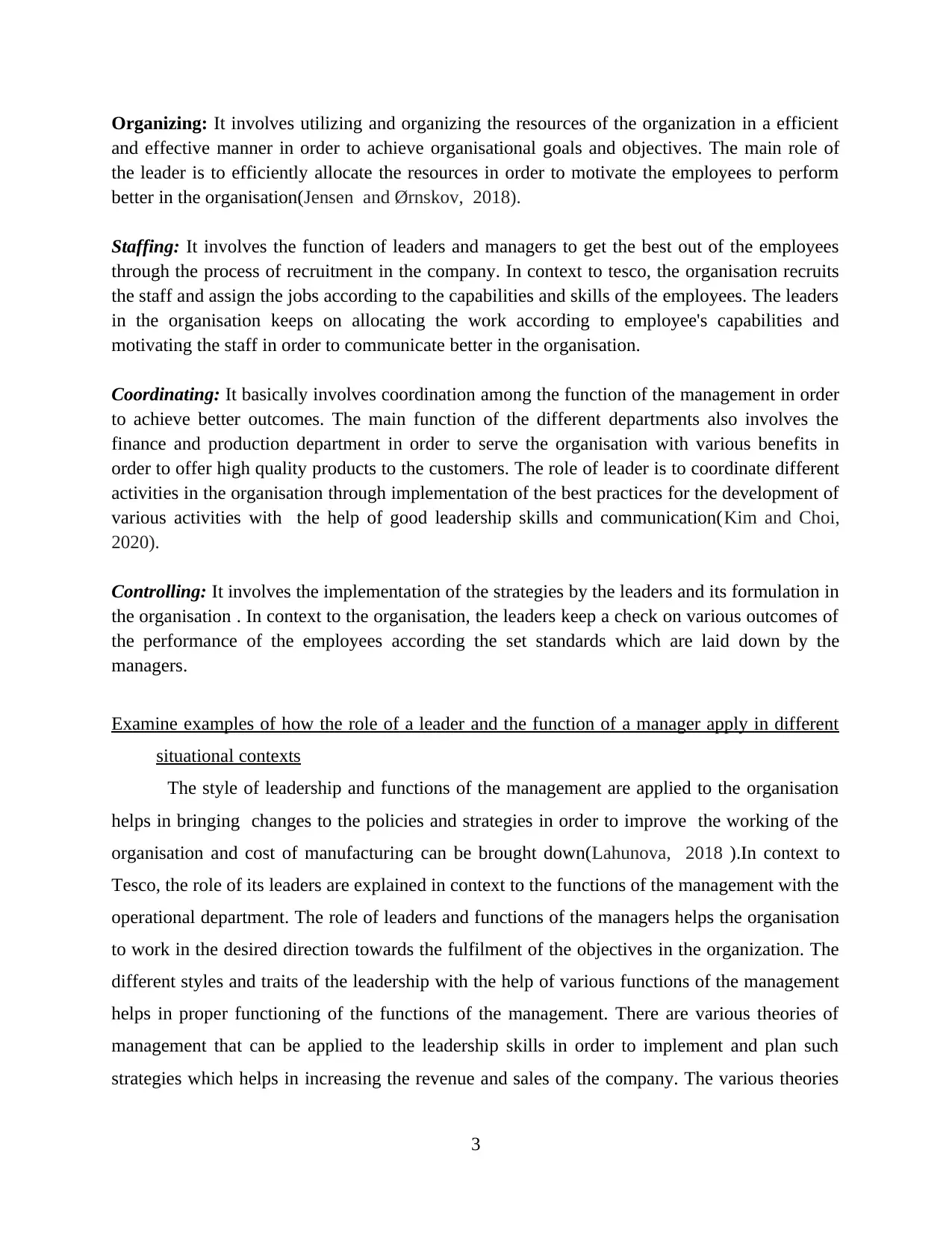
Organizing: It involves utilizing and organizing the resources of the organization in a efficient
and effective manner in order to achieve organisational goals and objectives. The main role of
the leader is to efficiently allocate the resources in order to motivate the employees to perform
better in the organisation(Jensen and Ørnskov, 2018).
Staffing: It involves the function of leaders and managers to get the best out of the employees
through the process of recruitment in the company. In context to tesco, the organisation recruits
the staff and assign the jobs according to the capabilities and skills of the employees. The leaders
in the organisation keeps on allocating the work according to employee's capabilities and
motivating the staff in order to communicate better in the organisation.
Coordinating: It basically involves coordination among the function of the management in order
to achieve better outcomes. The main function of the different departments also involves the
finance and production department in order to serve the organisation with various benefits in
order to offer high quality products to the customers. The role of leader is to coordinate different
activities in the organisation through implementation of the best practices for the development of
various activities with the help of good leadership skills and communication(Kim and Choi,
2020).
Controlling: It involves the implementation of the strategies by the leaders and its formulation in
the organisation . In context to the organisation, the leaders keep a check on various outcomes of
the performance of the employees according the set standards which are laid down by the
managers.
Examine examples of how the role of a leader and the function of a manager apply in different
situational contexts
The style of leadership and functions of the management are applied to the organisation
helps in bringing changes to the policies and strategies in order to improve the working of the
organisation and cost of manufacturing can be brought down(Lahunova, 2018 ).In context to
Tesco, the role of its leaders are explained in context to the functions of the management with the
operational department. The role of leaders and functions of the managers helps the organisation
to work in the desired direction towards the fulfilment of the objectives in the organization. The
different styles and traits of the leadership with the help of various functions of the management
helps in proper functioning of the functions of the management. There are various theories of
management that can be applied to the leadership skills in order to implement and plan such
strategies which helps in increasing the revenue and sales of the company. The various theories
3
and effective manner in order to achieve organisational goals and objectives. The main role of
the leader is to efficiently allocate the resources in order to motivate the employees to perform
better in the organisation(Jensen and Ørnskov, 2018).
Staffing: It involves the function of leaders and managers to get the best out of the employees
through the process of recruitment in the company. In context to tesco, the organisation recruits
the staff and assign the jobs according to the capabilities and skills of the employees. The leaders
in the organisation keeps on allocating the work according to employee's capabilities and
motivating the staff in order to communicate better in the organisation.
Coordinating: It basically involves coordination among the function of the management in order
to achieve better outcomes. The main function of the different departments also involves the
finance and production department in order to serve the organisation with various benefits in
order to offer high quality products to the customers. The role of leader is to coordinate different
activities in the organisation through implementation of the best practices for the development of
various activities with the help of good leadership skills and communication(Kim and Choi,
2020).
Controlling: It involves the implementation of the strategies by the leaders and its formulation in
the organisation . In context to the organisation, the leaders keep a check on various outcomes of
the performance of the employees according the set standards which are laid down by the
managers.
Examine examples of how the role of a leader and the function of a manager apply in different
situational contexts
The style of leadership and functions of the management are applied to the organisation
helps in bringing changes to the policies and strategies in order to improve the working of the
organisation and cost of manufacturing can be brought down(Lahunova, 2018 ).In context to
Tesco, the role of its leaders are explained in context to the functions of the management with the
operational department. The role of leaders and functions of the managers helps the organisation
to work in the desired direction towards the fulfilment of the objectives in the organization. The
different styles and traits of the leadership with the help of various functions of the management
helps in proper functioning of the functions of the management. There are various theories of
management that can be applied to the leadership skills in order to implement and plan such
strategies which helps in increasing the revenue and sales of the company. The various theories
3
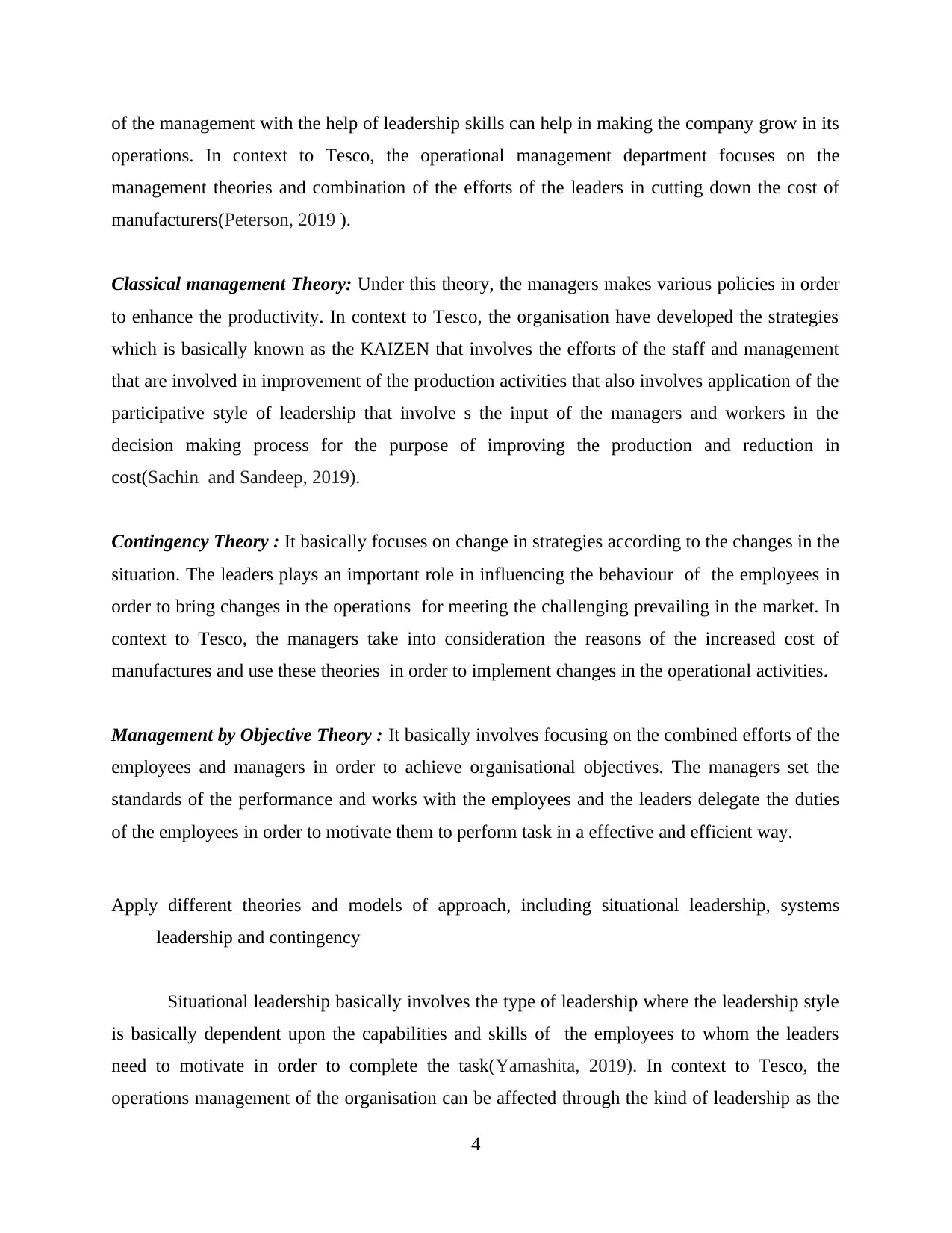
of the management with the help of leadership skills can help in making the company grow in its
operations. In context to Tesco, the operational management department focuses on the
management theories and combination of the efforts of the leaders in cutting down the cost of
manufacturers(Peterson, 2019 ).
Classical management Theory: Under this theory, the managers makes various policies in order
to enhance the productivity. In context to Tesco, the organisation have developed the strategies
which is basically known as the KAIZEN that involves the efforts of the staff and management
that are involved in improvement of the production activities that also involves application of the
participative style of leadership that involve s the input of the managers and workers in the
decision making process for the purpose of improving the production and reduction in
cost(Sachin and Sandeep, 2019).
Contingency Theory : It basically focuses on change in strategies according to the changes in the
situation. The leaders plays an important role in influencing the behaviour of the employees in
order to bring changes in the operations for meeting the challenging prevailing in the market. In
context to Tesco, the managers take into consideration the reasons of the increased cost of
manufactures and use these theories in order to implement changes in the operational activities.
Management by Objective Theory : It basically involves focusing on the combined efforts of the
employees and managers in order to achieve organisational objectives. The managers set the
standards of the performance and works with the employees and the leaders delegate the duties
of the employees in order to motivate them to perform task in a effective and efficient way.
Apply different theories and models of approach, including situational leadership, systems
leadership and contingency
Situational leadership basically involves the type of leadership where the leadership style
is basically dependent upon the capabilities and skills of the employees to whom the leaders
need to motivate in order to complete the task(Yamashita, 2019). In context to Tesco, the
operations management of the organisation can be affected through the kind of leadership as the
4
operations. In context to Tesco, the operational management department focuses on the
management theories and combination of the efforts of the leaders in cutting down the cost of
manufacturers(Peterson, 2019 ).
Classical management Theory: Under this theory, the managers makes various policies in order
to enhance the productivity. In context to Tesco, the organisation have developed the strategies
which is basically known as the KAIZEN that involves the efforts of the staff and management
that are involved in improvement of the production activities that also involves application of the
participative style of leadership that involve s the input of the managers and workers in the
decision making process for the purpose of improving the production and reduction in
cost(Sachin and Sandeep, 2019).
Contingency Theory : It basically focuses on change in strategies according to the changes in the
situation. The leaders plays an important role in influencing the behaviour of the employees in
order to bring changes in the operations for meeting the challenging prevailing in the market. In
context to Tesco, the managers take into consideration the reasons of the increased cost of
manufactures and use these theories in order to implement changes in the operational activities.
Management by Objective Theory : It basically involves focusing on the combined efforts of the
employees and managers in order to achieve organisational objectives. The managers set the
standards of the performance and works with the employees and the leaders delegate the duties
of the employees in order to motivate them to perform task in a effective and efficient way.
Apply different theories and models of approach, including situational leadership, systems
leadership and contingency
Situational leadership basically involves the type of leadership where the leadership style
is basically dependent upon the capabilities and skills of the employees to whom the leaders
need to motivate in order to complete the task(Yamashita, 2019). In context to Tesco, the
operations management of the organisation can be affected through the kind of leadership as the
4
⊘ This is a preview!⊘
Do you want full access?
Subscribe today to unlock all pages.

Trusted by 1+ million students worldwide
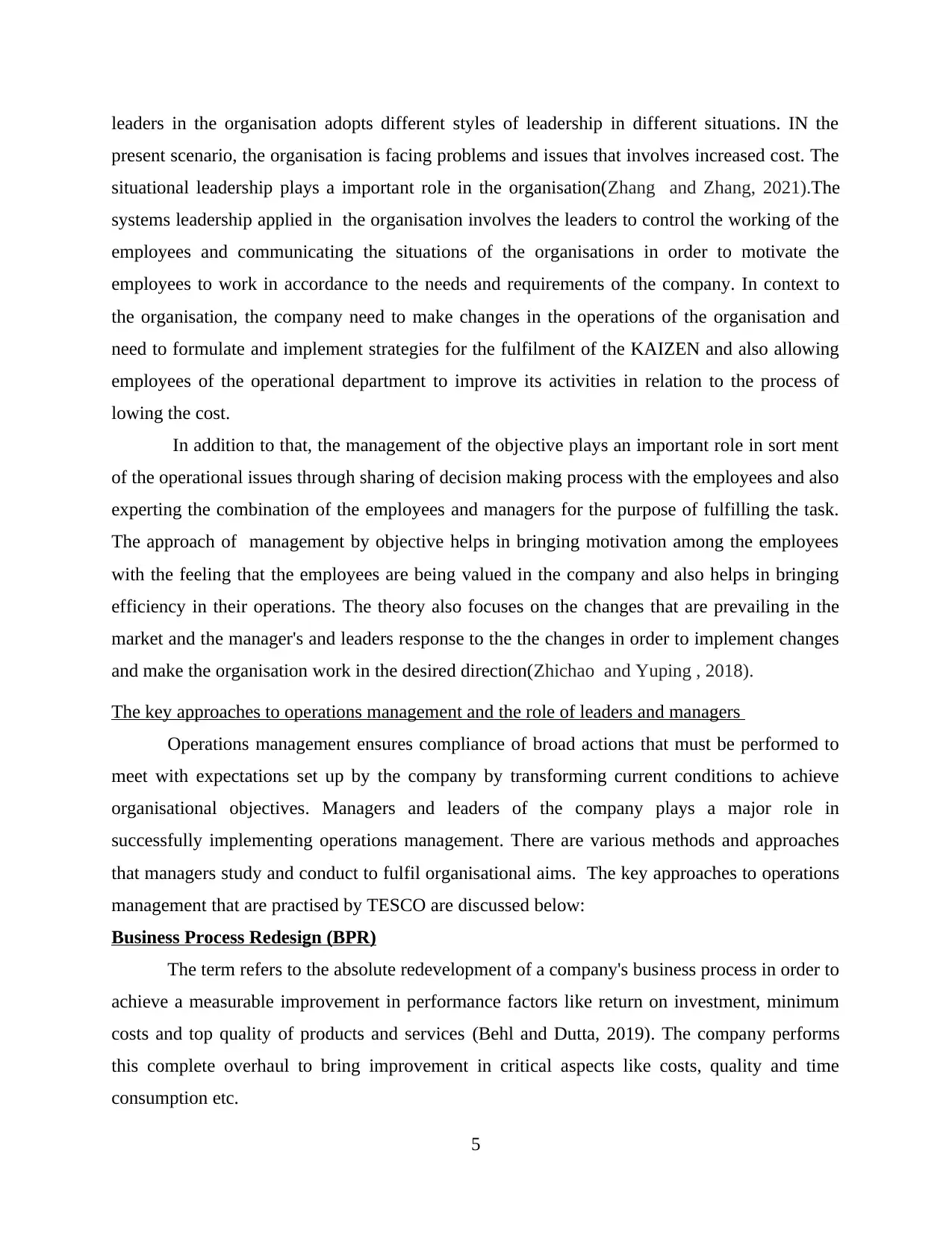
leaders in the organisation adopts different styles of leadership in different situations. IN the
present scenario, the organisation is facing problems and issues that involves increased cost. The
situational leadership plays a important role in the organisation(Zhang and Zhang, 2021).The
systems leadership applied in the organisation involves the leaders to control the working of the
employees and communicating the situations of the organisations in order to motivate the
employees to work in accordance to the needs and requirements of the company. In context to
the organisation, the company need to make changes in the operations of the organisation and
need to formulate and implement strategies for the fulfilment of the KAIZEN and also allowing
employees of the operational department to improve its activities in relation to the process of
lowing the cost.
In addition to that, the management of the objective plays an important role in sort ment
of the operational issues through sharing of decision making process with the employees and also
experting the combination of the employees and managers for the purpose of fulfilling the task.
The approach of management by objective helps in bringing motivation among the employees
with the feeling that the employees are being valued in the company and also helps in bringing
efficiency in their operations. The theory also focuses on the changes that are prevailing in the
market and the manager's and leaders response to the the changes in order to implement changes
and make the organisation work in the desired direction(Zhichao and Yuping , 2018).
The key approaches to operations management and the role of leaders and managers
Operations management ensures compliance of broad actions that must be performed to
meet with expectations set up by the company by transforming current conditions to achieve
organisational objectives. Managers and leaders of the company plays a major role in
successfully implementing operations management. There are various methods and approaches
that managers study and conduct to fulfil organisational aims. The key approaches to operations
management that are practised by TESCO are discussed below:
Business Process Redesign (BPR)
The term refers to the absolute redevelopment of a company's business process in order to
achieve a measurable improvement in performance factors like return on investment, minimum
costs and top quality of products and services (Behl and Dutta, 2019). The company performs
this complete overhaul to bring improvement in critical aspects like costs, quality and time
consumption etc.
5
present scenario, the organisation is facing problems and issues that involves increased cost. The
situational leadership plays a important role in the organisation(Zhang and Zhang, 2021).The
systems leadership applied in the organisation involves the leaders to control the working of the
employees and communicating the situations of the organisations in order to motivate the
employees to work in accordance to the needs and requirements of the company. In context to
the organisation, the company need to make changes in the operations of the organisation and
need to formulate and implement strategies for the fulfilment of the KAIZEN and also allowing
employees of the operational department to improve its activities in relation to the process of
lowing the cost.
In addition to that, the management of the objective plays an important role in sort ment
of the operational issues through sharing of decision making process with the employees and also
experting the combination of the employees and managers for the purpose of fulfilling the task.
The approach of management by objective helps in bringing motivation among the employees
with the feeling that the employees are being valued in the company and also helps in bringing
efficiency in their operations. The theory also focuses on the changes that are prevailing in the
market and the manager's and leaders response to the the changes in order to implement changes
and make the organisation work in the desired direction(Zhichao and Yuping , 2018).
The key approaches to operations management and the role of leaders and managers
Operations management ensures compliance of broad actions that must be performed to
meet with expectations set up by the company by transforming current conditions to achieve
organisational objectives. Managers and leaders of the company plays a major role in
successfully implementing operations management. There are various methods and approaches
that managers study and conduct to fulfil organisational aims. The key approaches to operations
management that are practised by TESCO are discussed below:
Business Process Redesign (BPR)
The term refers to the absolute redevelopment of a company's business process in order to
achieve a measurable improvement in performance factors like return on investment, minimum
costs and top quality of products and services (Behl and Dutta, 2019). The company performs
this complete overhaul to bring improvement in critical aspects like costs, quality and time
consumption etc.
5
Paraphrase This Document
Need a fresh take? Get an instant paraphrase of this document with our AI Paraphraser
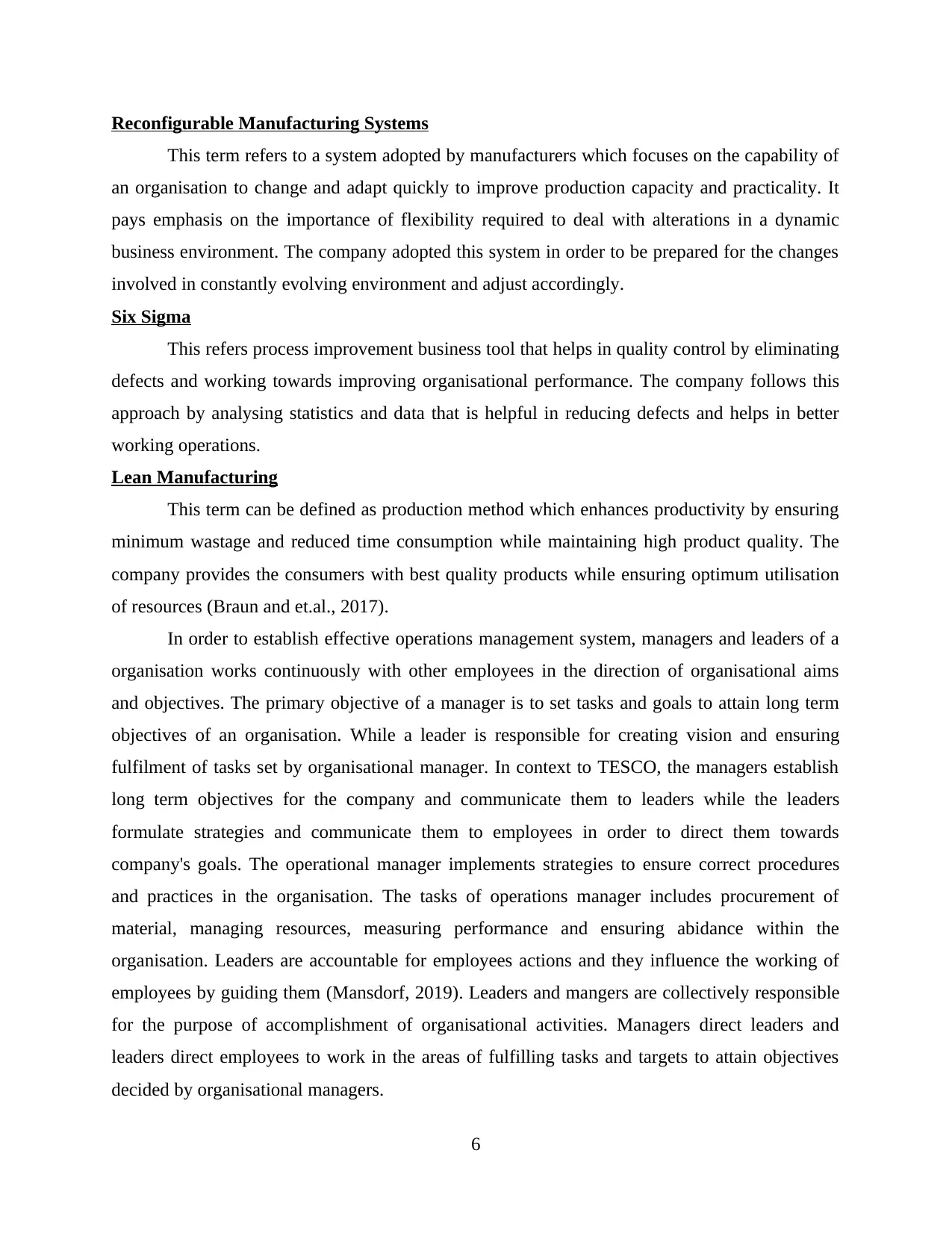
Reconfigurable Manufacturing Systems
This term refers to a system adopted by manufacturers which focuses on the capability of
an organisation to change and adapt quickly to improve production capacity and practicality. It
pays emphasis on the importance of flexibility required to deal with alterations in a dynamic
business environment. The company adopted this system in order to be prepared for the changes
involved in constantly evolving environment and adjust accordingly.
Six Sigma
This refers process improvement business tool that helps in quality control by eliminating
defects and working towards improving organisational performance. The company follows this
approach by analysing statistics and data that is helpful in reducing defects and helps in better
working operations.
Lean Manufacturing
This term can be defined as production method which enhances productivity by ensuring
minimum wastage and reduced time consumption while maintaining high product quality. The
company provides the consumers with best quality products while ensuring optimum utilisation
of resources (Braun and et.al., 2017).
In order to establish effective operations management system, managers and leaders of a
organisation works continuously with other employees in the direction of organisational aims
and objectives. The primary objective of a manager is to set tasks and goals to attain long term
objectives of an organisation. While a leader is responsible for creating vision and ensuring
fulfilment of tasks set by organisational manager. In context to TESCO, the managers establish
long term objectives for the company and communicate them to leaders while the leaders
formulate strategies and communicate them to employees in order to direct them towards
company's goals. The operational manager implements strategies to ensure correct procedures
and practices in the organisation. The tasks of operations manager includes procurement of
material, managing resources, measuring performance and ensuring abidance within the
organisation. Leaders are accountable for employees actions and they influence the working of
employees by guiding them (Mansdorf, 2019). Leaders and mangers are collectively responsible
for the purpose of accomplishment of organisational activities. Managers direct leaders and
leaders direct employees to work in the areas of fulfilling tasks and targets to attain objectives
decided by organisational managers.
6
This term refers to a system adopted by manufacturers which focuses on the capability of
an organisation to change and adapt quickly to improve production capacity and practicality. It
pays emphasis on the importance of flexibility required to deal with alterations in a dynamic
business environment. The company adopted this system in order to be prepared for the changes
involved in constantly evolving environment and adjust accordingly.
Six Sigma
This refers process improvement business tool that helps in quality control by eliminating
defects and working towards improving organisational performance. The company follows this
approach by analysing statistics and data that is helpful in reducing defects and helps in better
working operations.
Lean Manufacturing
This term can be defined as production method which enhances productivity by ensuring
minimum wastage and reduced time consumption while maintaining high product quality. The
company provides the consumers with best quality products while ensuring optimum utilisation
of resources (Braun and et.al., 2017).
In order to establish effective operations management system, managers and leaders of a
organisation works continuously with other employees in the direction of organisational aims
and objectives. The primary objective of a manager is to set tasks and goals to attain long term
objectives of an organisation. While a leader is responsible for creating vision and ensuring
fulfilment of tasks set by organisational manager. In context to TESCO, the managers establish
long term objectives for the company and communicate them to leaders while the leaders
formulate strategies and communicate them to employees in order to direct them towards
company's goals. The operational manager implements strategies to ensure correct procedures
and practices in the organisation. The tasks of operations manager includes procurement of
material, managing resources, measuring performance and ensuring abidance within the
organisation. Leaders are accountable for employees actions and they influence the working of
employees by guiding them (Mansdorf, 2019). Leaders and mangers are collectively responsible
for the purpose of accomplishment of organisational activities. Managers direct leaders and
leaders direct employees to work in the areas of fulfilling tasks and targets to attain objectives
decided by organisational managers.
6
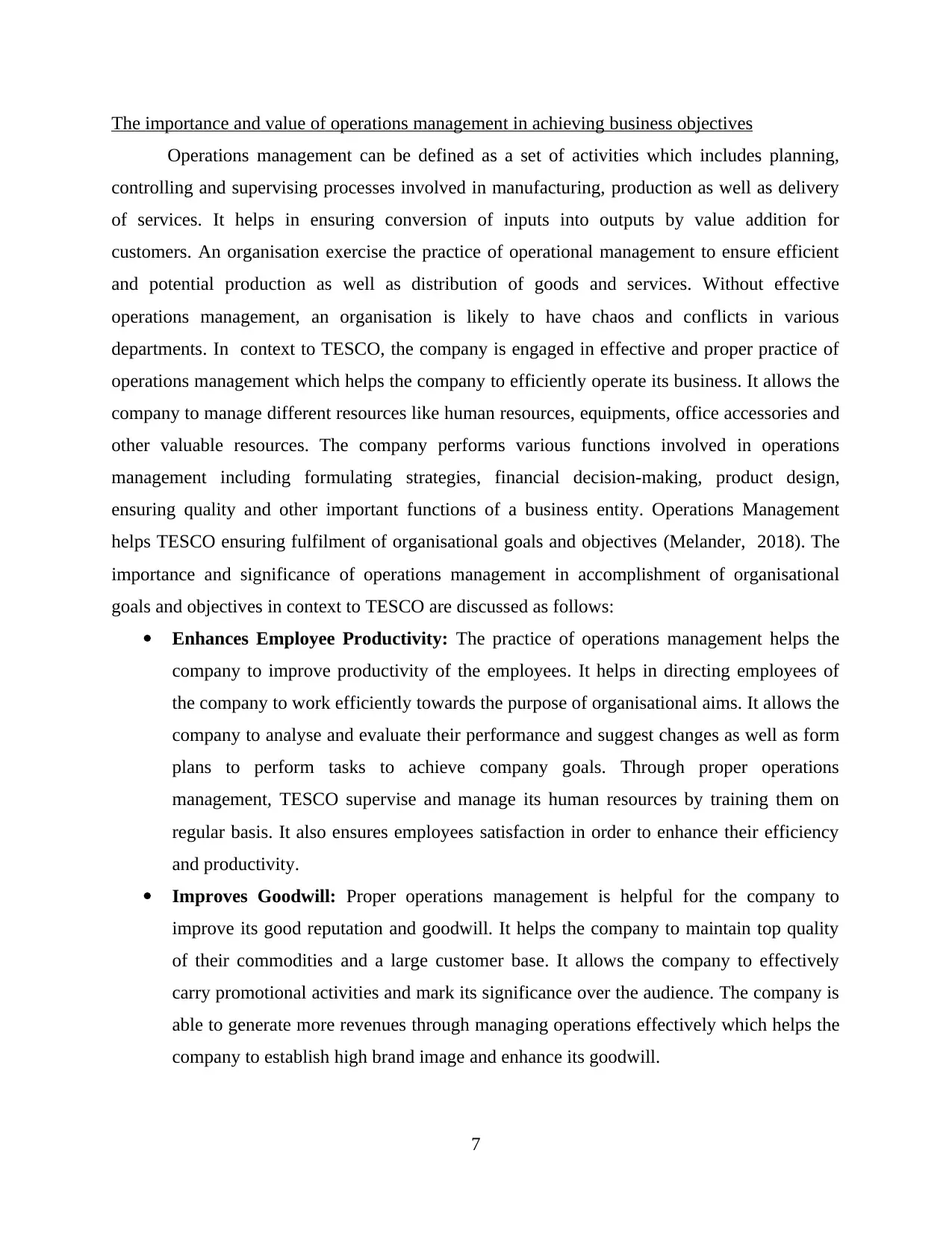
The importance and value of operations management in achieving business objectives
Operations management can be defined as a set of activities which includes planning,
controlling and supervising processes involved in manufacturing, production as well as delivery
of services. It helps in ensuring conversion of inputs into outputs by value addition for
customers. An organisation exercise the practice of operational management to ensure efficient
and potential production as well as distribution of goods and services. Without effective
operations management, an organisation is likely to have chaos and conflicts in various
departments. In context to TESCO, the company is engaged in effective and proper practice of
operations management which helps the company to efficiently operate its business. It allows the
company to manage different resources like human resources, equipments, office accessories and
other valuable resources. The company performs various functions involved in operations
management including formulating strategies, financial decision-making, product design,
ensuring quality and other important functions of a business entity. Operations Management
helps TESCO ensuring fulfilment of organisational goals and objectives (Melander, 2018). The
importance and significance of operations management in accomplishment of organisational
goals and objectives in context to TESCO are discussed as follows:
Enhances Employee Productivity: The practice of operations management helps the
company to improve productivity of the employees. It helps in directing employees of
the company to work efficiently towards the purpose of organisational aims. It allows the
company to analyse and evaluate their performance and suggest changes as well as form
plans to perform tasks to achieve company goals. Through proper operations
management, TESCO supervise and manage its human resources by training them on
regular basis. It also ensures employees satisfaction in order to enhance their efficiency
and productivity.
Improves Goodwill: Proper operations management is helpful for the company to
improve its good reputation and goodwill. It helps the company to maintain top quality
of their commodities and a large customer base. It allows the company to effectively
carry promotional activities and mark its significance over the audience. The company is
able to generate more revenues through managing operations effectively which helps the
company to establish high brand image and enhance its goodwill.
7
Operations management can be defined as a set of activities which includes planning,
controlling and supervising processes involved in manufacturing, production as well as delivery
of services. It helps in ensuring conversion of inputs into outputs by value addition for
customers. An organisation exercise the practice of operational management to ensure efficient
and potential production as well as distribution of goods and services. Without effective
operations management, an organisation is likely to have chaos and conflicts in various
departments. In context to TESCO, the company is engaged in effective and proper practice of
operations management which helps the company to efficiently operate its business. It allows the
company to manage different resources like human resources, equipments, office accessories and
other valuable resources. The company performs various functions involved in operations
management including formulating strategies, financial decision-making, product design,
ensuring quality and other important functions of a business entity. Operations Management
helps TESCO ensuring fulfilment of organisational goals and objectives (Melander, 2018). The
importance and significance of operations management in accomplishment of organisational
goals and objectives in context to TESCO are discussed as follows:
Enhances Employee Productivity: The practice of operations management helps the
company to improve productivity of the employees. It helps in directing employees of
the company to work efficiently towards the purpose of organisational aims. It allows the
company to analyse and evaluate their performance and suggest changes as well as form
plans to perform tasks to achieve company goals. Through proper operations
management, TESCO supervise and manage its human resources by training them on
regular basis. It also ensures employees satisfaction in order to enhance their efficiency
and productivity.
Improves Goodwill: Proper operations management is helpful for the company to
improve its good reputation and goodwill. It helps the company to maintain top quality
of their commodities and a large customer base. It allows the company to effectively
carry promotional activities and mark its significance over the audience. The company is
able to generate more revenues through managing operations effectively which helps the
company to establish high brand image and enhance its goodwill.
7
⊘ This is a preview!⊘
Do you want full access?
Subscribe today to unlock all pages.

Trusted by 1+ million students worldwide
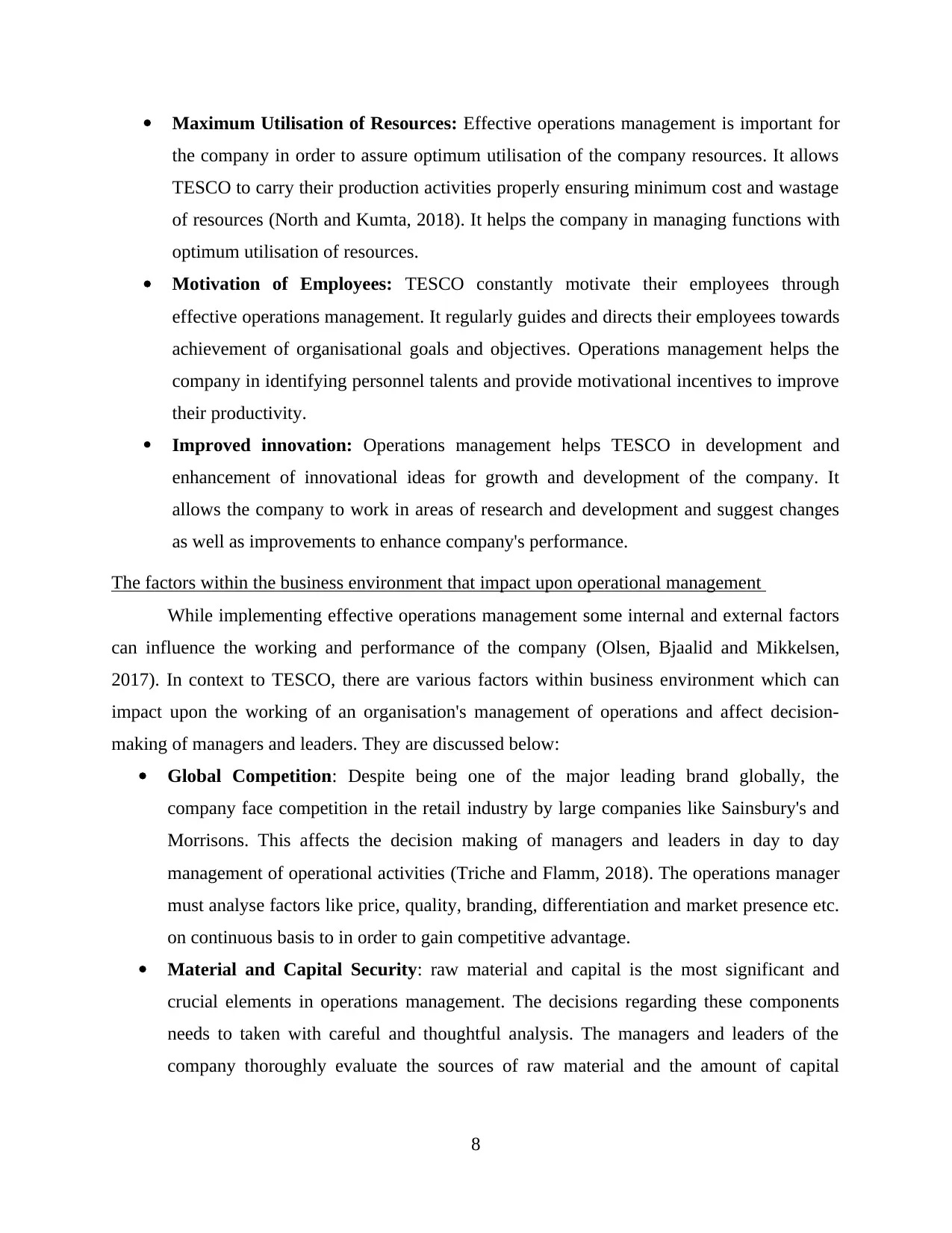
Maximum Utilisation of Resources: Effective operations management is important for
the company in order to assure optimum utilisation of the company resources. It allows
TESCO to carry their production activities properly ensuring minimum cost and wastage
of resources (North and Kumta, 2018). It helps the company in managing functions with
optimum utilisation of resources.
Motivation of Employees: TESCO constantly motivate their employees through
effective operations management. It regularly guides and directs their employees towards
achievement of organisational goals and objectives. Operations management helps the
company in identifying personnel talents and provide motivational incentives to improve
their productivity.
Improved innovation: Operations management helps TESCO in development and
enhancement of innovational ideas for growth and development of the company. It
allows the company to work in areas of research and development and suggest changes
as well as improvements to enhance company's performance.
The factors within the business environment that impact upon operational management
While implementing effective operations management some internal and external factors
can influence the working and performance of the company (Olsen, Bjaalid and Mikkelsen,
2017). In context to TESCO, there are various factors within business environment which can
impact upon the working of an organisation's management of operations and affect decision-
making of managers and leaders. They are discussed below:
Global Competition: Despite being one of the major leading brand globally, the
company face competition in the retail industry by large companies like Sainsbury's and
Morrisons. This affects the decision making of managers and leaders in day to day
management of operational activities (Triche and Flamm, 2018). The operations manager
must analyse factors like price, quality, branding, differentiation and market presence etc.
on continuous basis to in order to gain competitive advantage.
Material and Capital Security: raw material and capital is the most significant and
crucial elements in operations management. The decisions regarding these components
needs to taken with careful and thoughtful analysis. The managers and leaders of the
company thoroughly evaluate the sources of raw material and the amount of capital
8
the company in order to assure optimum utilisation of the company resources. It allows
TESCO to carry their production activities properly ensuring minimum cost and wastage
of resources (North and Kumta, 2018). It helps the company in managing functions with
optimum utilisation of resources.
Motivation of Employees: TESCO constantly motivate their employees through
effective operations management. It regularly guides and directs their employees towards
achievement of organisational goals and objectives. Operations management helps the
company in identifying personnel talents and provide motivational incentives to improve
their productivity.
Improved innovation: Operations management helps TESCO in development and
enhancement of innovational ideas for growth and development of the company. It
allows the company to work in areas of research and development and suggest changes
as well as improvements to enhance company's performance.
The factors within the business environment that impact upon operational management
While implementing effective operations management some internal and external factors
can influence the working and performance of the company (Olsen, Bjaalid and Mikkelsen,
2017). In context to TESCO, there are various factors within business environment which can
impact upon the working of an organisation's management of operations and affect decision-
making of managers and leaders. They are discussed below:
Global Competition: Despite being one of the major leading brand globally, the
company face competition in the retail industry by large companies like Sainsbury's and
Morrisons. This affects the decision making of managers and leaders in day to day
management of operational activities (Triche and Flamm, 2018). The operations manager
must analyse factors like price, quality, branding, differentiation and market presence etc.
on continuous basis to in order to gain competitive advantage.
Material and Capital Security: raw material and capital is the most significant and
crucial elements in operations management. The decisions regarding these components
needs to taken with careful and thoughtful analysis. The managers and leaders of the
company thoroughly evaluate the sources of raw material and the amount of capital
8
Paraphrase This Document
Need a fresh take? Get an instant paraphrase of this document with our AI Paraphraser
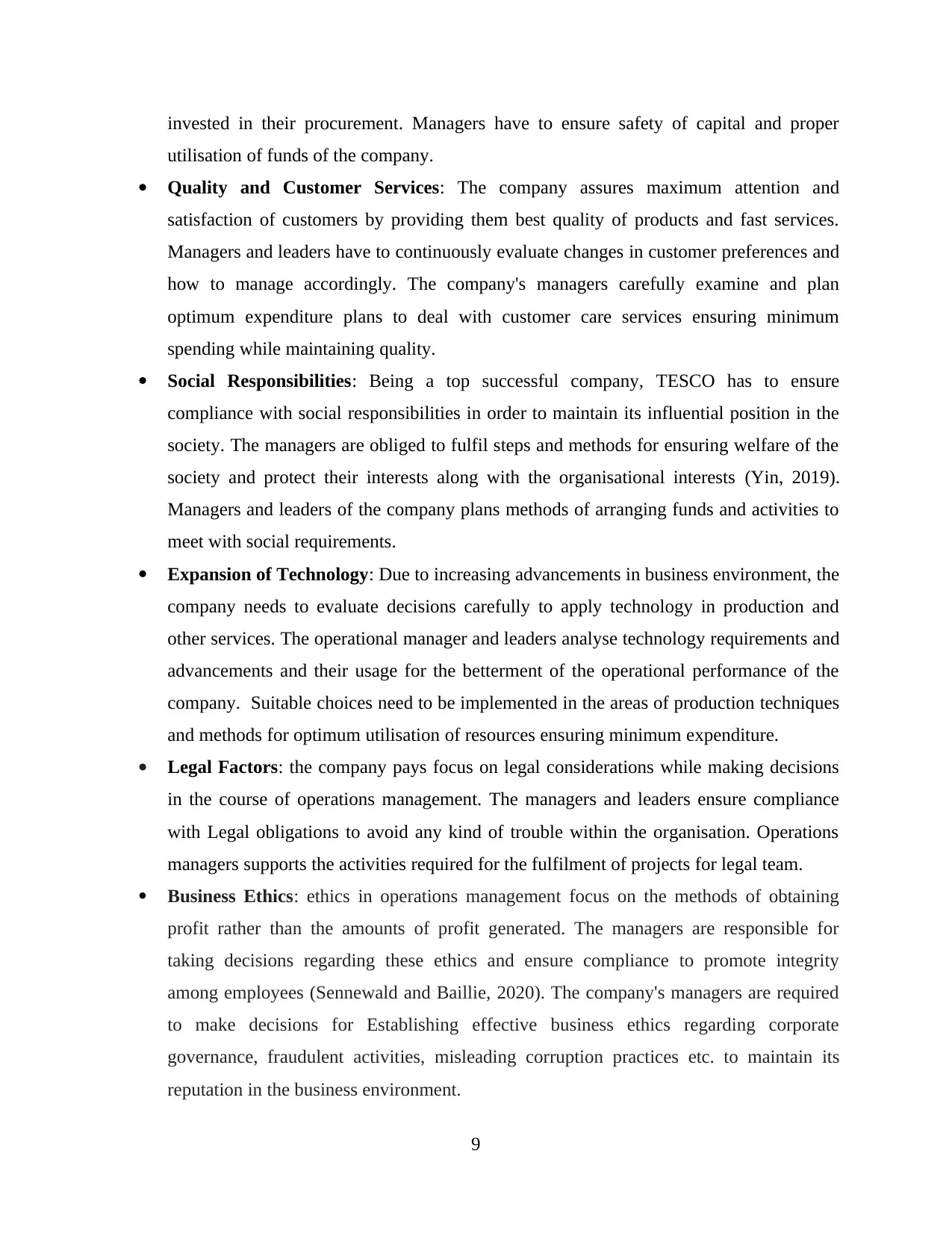
invested in their procurement. Managers have to ensure safety of capital and proper
utilisation of funds of the company.
Quality and Customer Services: The company assures maximum attention and
satisfaction of customers by providing them best quality of products and fast services.
Managers and leaders have to continuously evaluate changes in customer preferences and
how to manage accordingly. The company's managers carefully examine and plan
optimum expenditure plans to deal with customer care services ensuring minimum
spending while maintaining quality.
Social Responsibilities: Being a top successful company, TESCO has to ensure
compliance with social responsibilities in order to maintain its influential position in the
society. The managers are obliged to fulfil steps and methods for ensuring welfare of the
society and protect their interests along with the organisational interests (Yin, 2019).
Managers and leaders of the company plans methods of arranging funds and activities to
meet with social requirements.
Expansion of Technology: Due to increasing advancements in business environment, the
company needs to evaluate decisions carefully to apply technology in production and
other services. The operational manager and leaders analyse technology requirements and
advancements and their usage for the betterment of the operational performance of the
company. Suitable choices need to be implemented in the areas of production techniques
and methods for optimum utilisation of resources ensuring minimum expenditure.
Legal Factors: the company pays focus on legal considerations while making decisions
in the course of operations management. The managers and leaders ensure compliance
with Legal obligations to avoid any kind of trouble within the organisation. Operations
managers supports the activities required for the fulfilment of projects for legal team.
Business Ethics: ethics in operations management focus on the methods of obtaining
profit rather than the amounts of profit generated. The managers are responsible for
taking decisions regarding these ethics and ensure compliance to promote integrity
among employees (Sennewald and Baillie, 2020). The company's managers are required
to make decisions for Establishing effective business ethics regarding corporate
governance, fraudulent activities, misleading corruption practices etc. to maintain its
reputation in the business environment.
9
utilisation of funds of the company.
Quality and Customer Services: The company assures maximum attention and
satisfaction of customers by providing them best quality of products and fast services.
Managers and leaders have to continuously evaluate changes in customer preferences and
how to manage accordingly. The company's managers carefully examine and plan
optimum expenditure plans to deal with customer care services ensuring minimum
spending while maintaining quality.
Social Responsibilities: Being a top successful company, TESCO has to ensure
compliance with social responsibilities in order to maintain its influential position in the
society. The managers are obliged to fulfil steps and methods for ensuring welfare of the
society and protect their interests along with the organisational interests (Yin, 2019).
Managers and leaders of the company plans methods of arranging funds and activities to
meet with social requirements.
Expansion of Technology: Due to increasing advancements in business environment, the
company needs to evaluate decisions carefully to apply technology in production and
other services. The operational manager and leaders analyse technology requirements and
advancements and their usage for the betterment of the operational performance of the
company. Suitable choices need to be implemented in the areas of production techniques
and methods for optimum utilisation of resources ensuring minimum expenditure.
Legal Factors: the company pays focus on legal considerations while making decisions
in the course of operations management. The managers and leaders ensure compliance
with Legal obligations to avoid any kind of trouble within the organisation. Operations
managers supports the activities required for the fulfilment of projects for legal team.
Business Ethics: ethics in operations management focus on the methods of obtaining
profit rather than the amounts of profit generated. The managers are responsible for
taking decisions regarding these ethics and ensure compliance to promote integrity
among employees (Sennewald and Baillie, 2020). The company's managers are required
to make decisions for Establishing effective business ethics regarding corporate
governance, fraudulent activities, misleading corruption practices etc. to maintain its
reputation in the business environment.
9
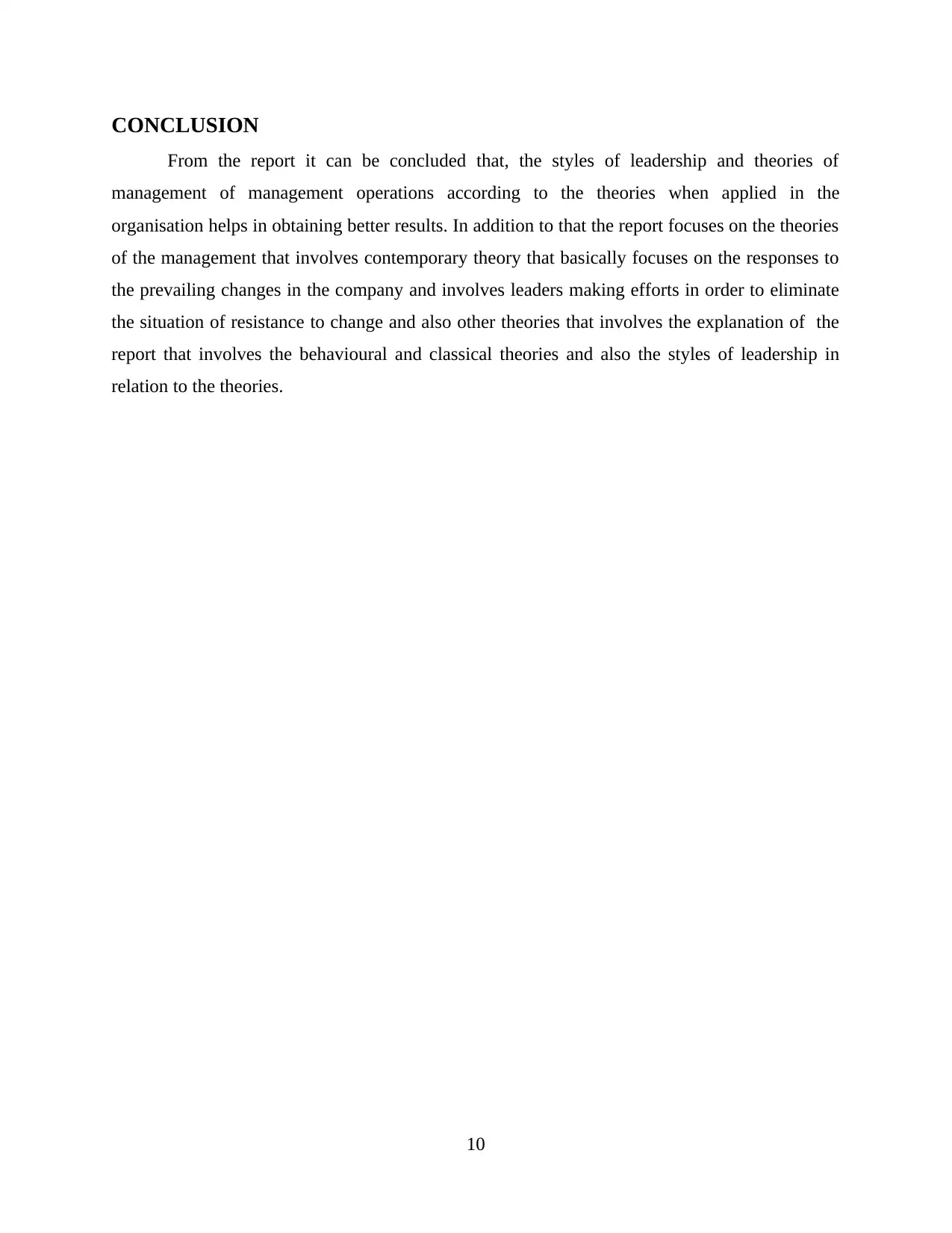
CONCLUSION
From the report it can be concluded that, the styles of leadership and theories of
management of management operations according to the theories when applied in the
organisation helps in obtaining better results. In addition to that the report focuses on the theories
of the management that involves contemporary theory that basically focuses on the responses to
the prevailing changes in the company and involves leaders making efforts in order to eliminate
the situation of resistance to change and also other theories that involves the explanation of the
report that involves the behavioural and classical theories and also the styles of leadership in
relation to the theories.
10
From the report it can be concluded that, the styles of leadership and theories of
management of management operations according to the theories when applied in the
organisation helps in obtaining better results. In addition to that the report focuses on the theories
of the management that involves contemporary theory that basically focuses on the responses to
the prevailing changes in the company and involves leaders making efforts in order to eliminate
the situation of resistance to change and also other theories that involves the explanation of the
report that involves the behavioural and classical theories and also the styles of leadership in
relation to the theories.
10
⊘ This is a preview!⊘
Do you want full access?
Subscribe today to unlock all pages.

Trusted by 1+ million students worldwide
1 out of 15
Related Documents
Your All-in-One AI-Powered Toolkit for Academic Success.
+13062052269
info@desklib.com
Available 24*7 on WhatsApp / Email
![[object Object]](/_next/static/media/star-bottom.7253800d.svg)
Unlock your academic potential
Copyright © 2020–2026 A2Z Services. All Rights Reserved. Developed and managed by ZUCOL.




